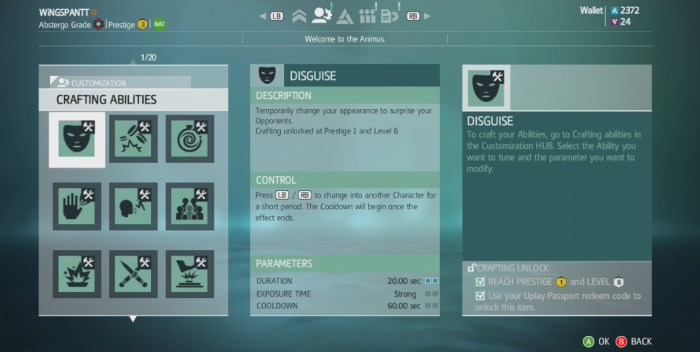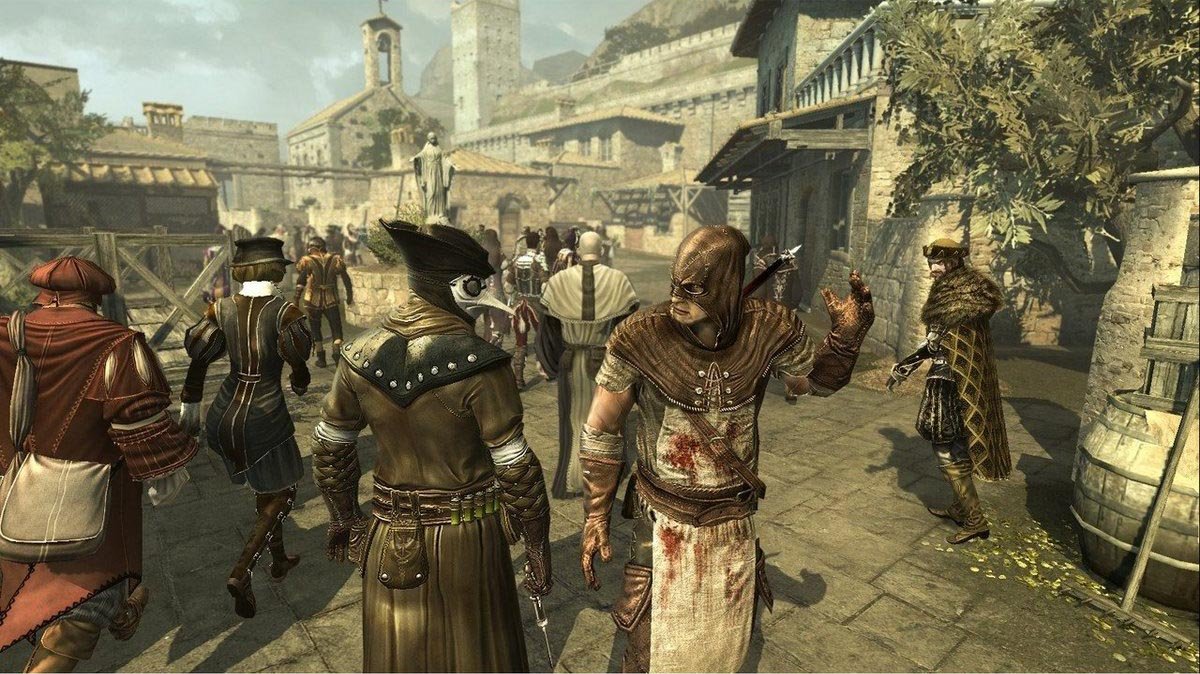


Welcome to Part 13 of WiNGSPANTT’s Assassin’s Creed 4: Black Flag multiplayer strategy guide!
In this guide’s abilities section, I’m going to discuss (surprise!) Black Flag’s abilities, perks, and streaks, and how they should be used if you want to win matches online. While a lot of skills are pretty much self-explanatory in function, the nuances of how they are best applied to the dynamic situation of a live match are often lost on beginners or intermediate players.
Of course, that same seat-of-your-pants/skirt action also means that no ability guide could ever completely cover every situation, use, or optimization for each ability. As such, you’re going to have to form your own opinions, do your own research, and ultimately choose abilities/ability sets based on your personal playstyle (and the patterns of your opponents). If you absolutely hate Poison Dart and your enemies never run or stun bait, then there’s no point using it.
In addition to overall strategy and bullet-point tips, I’m also including ratings for each Assassin’s Creed 4 ability to give you a quick-glance evaluation. These aren’t the only factors that determine if an ability is good or if you should equip it, but they’re good starting points for discussion.
Versatility: How many different situations can the ability be used in? Contrarily, how often will you wish you had something else equipped? Versatile abilities help you maximize your options and score.
Reliability: How often is this ability available, and what are the odds it will actually succeed? How much of its effect relies on luck, lag, or human stupidity? Reliable skills simply work when you need them to.
High-Scoring: How much will this ability increase your score, or decrease the score of your adversaries? Will equipping this ability directly contribute to your total? High-scoring skills fuel leads and comebacks.
For the most part, gameplay tips and ratings will be based on free-for-all multiplayer modes (Deathmatch, Wanted, Assassinate), though a lot of the advice given can be extrapolated into team-based play. Just keep in mind that ability set construction in team modes depends greatly on what your teammates are bringing and what role(s) you’re playing in any given mode.
Finally, if you want to know what an ability does, how long its effect lasts, ideal crafting, or anything like that, refer to either the Black Flag Ability Crafting Guide or the in-game database itself. While I love hearing myself talk/type, I really have no interest in copy/pasting data straight from my AC4 disc.
Nothing says “LOL @ your plans” like Animus Shield. It single-handedly counters the majority of abilities in the game, including go-to defensive abilities like Smoke Bomb, Tripwire Bomb, Time Phase, and Throwing Knifes. For this reason, it is primarily useful as an offensive tool, allowing you to thwart stun baiting or escape tactics by completely negating them. Approach your target, turn on your shield the instant before they blast you with an ability, then laugh as you proceed to remove their internal organs.
Animus Shield can be used defensively, but usually only to stop things like Pistol or Poison Dart from hitting you. If you can cast it reactively to those abilities, it can help you maintain momentum in FFA modes where death can ruin your approach and/or streaks. But using Animus Shield for other defensive reasons isn’t usually worth it. Best case scenario, Animus Shield gets you a contested stun instead of outright death, netting you 100 points.
New players have a hard time using Animus Shield because it’s only good when you’re able to correctly predict your opponent’s strategy. If your target wasn’t planning to stun you and/or you activate it too early, you’ll waste the ability and give yourself away. Your target will flee or attempt to stun you, greatly reducing your score. Even worse: if you’re gullible or over-eager for kills, you might wait too long and be eat a headbutt to the face.
Unfortunately there’s no shortcut for learning when to use Animus Shield; you must simply practice observing player behavior and look/listen for tells. Also be mindful of the patterns of the specific players in your lobby. If you know a few people are relying on Smoke Bomb and Pistol, equipping Animus Shield is probably a good call.
Animus Shield is often derided by players as a crutch, but the reality is that there are certain situations that are simply too annoying to deal with otherwise. If you know someone is sitting on a Tripwire Bomb in a blend group waiting to use Firecrackers on you, your options are: ranged weapon, Animus Shield, or rage quit. Given the choice, Animus Shield seems like a reasonable pick.
Animus Shield tips
Disguise is one of the best abilities in Assassin’s Creed multiplayer, not only in terms of power, but also in terms of design. Since the entire game revolves around identifying and evading other players, the ability to change your appearance is an at-once easily understandable advantage.
While the ability is great for hiding from (and stunning) pursuers, it’s best used in simultaneously defensive and offensive situations. By activating Disguise immediately before approaching a target, you’ll decrease the odds of being murdered en route while simultaneously cutting down on the suspicions of your prey (assuming they’ve previously guessed your persona). If it works well, you’ll score an easy 700+ point kill while managing a chained stun on your baffled assassin. Combined with an relatively short cooldown, this potential means oodles of points over the course of a match.
Ideally, you will activate Disguise immediately before visual or audio cues could give you away. Use it around a corner, outside of whisper/heartbeat range, before moving in. Disguise lasts a long time, so don’t rush… carefully get into position for high-value kills or stuns. Avoid using abilities that could break your cover, and go for focus bonuses when possible.
Disguise can also be used as an ad-hoc chase breaker. By cutting a corner and losing the lock between you and your pursuer (then activating Disguise), you can instantly sow doubt in the mind of your previously bloodthirsty murderer. Go for the stun (or even the focus stun) and laugh your way to the bank. The comedy bank.
However, Disguise is not a magic bullet; its efficacy scales directly with your skill and your opponents’. If you absolutely suck at approaching your victims or hiding from your pursuers, Disguise will grant you minimal gains. Good players will be able to spot you walking erratically, illuminating their LOS compass, or activating the whispers when walking into range. To get the most out of this ability, you should stick near other NPCs and blend groups that will give enemies doubts about who you really are. That said, remember that even though enemies may not be able to pick you out of a crowd, you’ll still activate HUD and audio cues that will prompt them to grow suspicious. If you wait too long to strike, your foes will activate revealing abilities and/or flee the area.
Disguise Tips
Glimmer is extremely similar to Disguise in execution and functionality, essentially making it more difficult for other players to correctly spot you. It shares many of the same drawbacks, too: expert players will still identify you when you’re playing sloppy, and being caught mid-animation is basically a death sentence. So let’s talk about the differences in these abilities and how they affect gameplay.
Complete invisibility is obviously an advantage over anonymity in most situations. With Disguise, you can’t just walk up to your target solo without arousing suspicion. You can’t hide in a small blend group while maintaining good odds of surviving a random kill. You cannot climb a building or walk through a chase breaker and not immediately give yourself away as a player character.
With Glimmer, you can stand in the middle of an open area without consequence. You can hang in waiting for an acrobatic kill, or approach players from angles that NPCs never take. You can jump into or out of a haybale without a drastic, telltale animation. The obvious tradeoff is that Glimmer lasts much, much shorter than Disguise, giving you significantly less time to move into position, build your meter, or lose your pursuers. If you don’t already have a solid plan when you activate Glimmer, odds are you won’t be able to formulate one before your opacity is restored.
Glimmer Tips
I’m not even going to talk about how to use Poison, since it’s pretty self-explanatory. Instead, I want to focus on what Poison is great at doing and what it’s not great at doing, and why I gave it the ratings I did.
Poison is good at exactly two things: boosting your score and freeing you from assassination animations. The former is obvious; the latter, less so. Since one of the easiest ways to get uncontested kills and stuns in the game is acting on a player while she’s mid-animation, Poison greatly increases your spatial awareness and defensive capabilities by avoiding drawn-out kill sequences on your target. Assuming your prey doesn’t detect/stun you, you’ll be immediately able to use abilities, run away, or kill/stun someone else while the last sucker chokes on his own tongue. This flexibility is especially welcome in Assassinate, where sticking around the murder pile is usually not in your best interest.
Outside of these advantages, Poison is typically useless. You can’t use it on your pursuers. You can’t use it on neutral players. You can’t use it on runners or roofers, or really anyone who is aware that you’re their killer (unless you combine it with something like Disguise first). It has a nasty cooldown, too, so it’s often not ready when you need it most. Even when you do Poison your victim, your kill will sometimes be intercepted by another player (including your dumbass teammates). As such, it’s one of the most simultaneously narrow and powerful abilities in Assassin’s Creed multiplayer.
Poison Tips
Teleport is an ability that is slightly more flexible than it appears. Beginners will think it’s a funny gimmick, then eventually learn it’s useful for Artifact Assault. Everyone will figure out it’s basically pointless in Assassinate and Deathmatch. But what about Wanted?
Teleport is often overlooked in Wanted because of its low scoring potential, long cooldown, and slow startup time. But the ability to semi-instantly move away from pursuers and towards your target is not something to take likely. This is especially true in Assassin’s Creed 4, where the removal of chases and hard stun abilities means there are fewer ways than ever to escape your killers.
In tense Wanted matches, Teleport can help you maintain a lead by making it nearly impossible for anyone to corner and kill you. If you’ve got two or more pursuers and beam yourself up as soon as the whispers begin, odds are it will be another 30 to 45 seconds before your murderers relocate you. This could be just enough time for you to score a big kill on your target, or enough of a distraction to lead your pursuers to their own deaths.
If you move to the edge of the map and Teleport towards the center, you can effectively swap places with your pursuers, leaving them in the worst geographic position while opening every escape route to yourself. If you practice Teleporting enough, you can also BAMF your way to specific destinations, including right on top of your target!
Overall, Teleport is not a particularly versatile skill, but is a good choice when you’ve got the lead and are trying to dance around multiple pursuers. Combined with other point starving techniques, Teleport can keep you one (quantum) step ahead of the competition.
Teleport Tips
Looking for more tips? Head back to the main Assassin’s Creed multiplayer strategy guide index.




 Assassins Creed Brotherhood Multiplayer Strategy HD
Assassins Creed Brotherhood Multiplayer Strategy HD AC4 Black Flag multiplayer strategy #11: Mastering Controls
AC4 Black Flag multiplayer strategy #11: Mastering Controls Assassins Creed Brotherhood PC Strategy Video
Assassins Creed Brotherhood PC Strategy Video WiNGSPAN helps celebrate RudeOnion’s YouTube triumphs
WiNGSPAN helps celebrate RudeOnion’s YouTube triumphs “Animus Hack” Assassin’s Creed 3 multiplayer rap video
“Animus Hack” Assassin’s Creed 3 multiplayer rap video